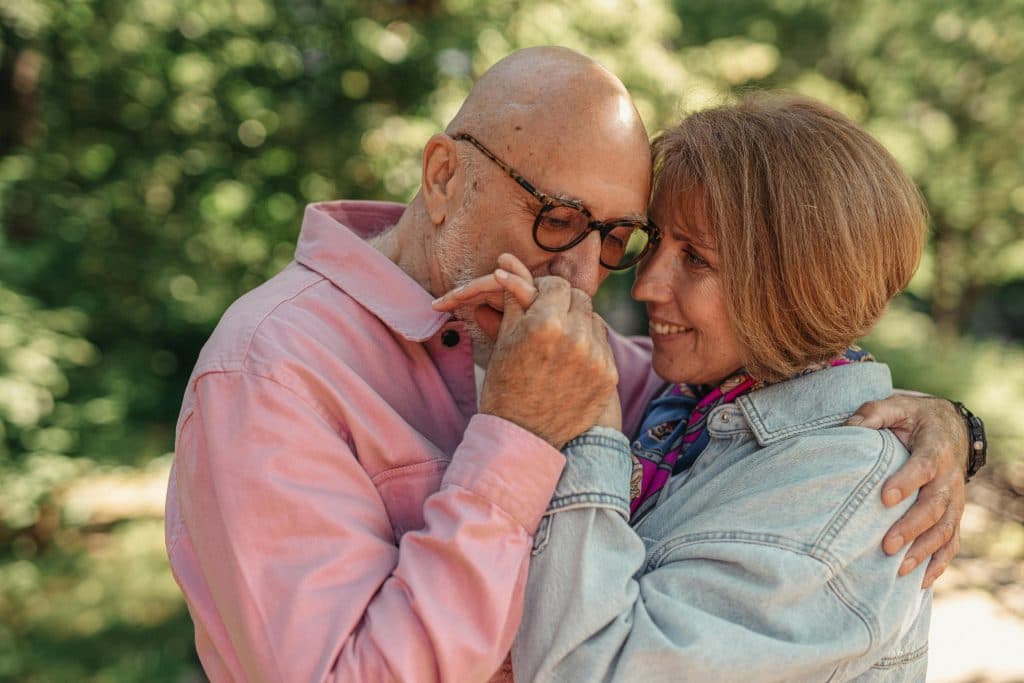Caring tips
Sexuality After 60: Thriving Beyond Taboos
Scroll down

24 September 2025
|
4 min
Sexuality is often linked with youth and vitality, leaving little room for discussions about pleasure and intimacy among seniors. However, the reality is quite different: sexuality has no age limit and can remain a significant part of emotional and physical well-being even after 60. Let’s address this often-taboo subject and explore how seniors can thrive sexually in later stages of life.
Debunking the Myths
Myth #1: Sexual desire does not disappear with age
The first step towards thriving sexually after 60 is debunking myths about sexuality in seniors. Contrary to popular belief, sexual desire does not fade with age. Studies show that many seniors continue to have an active and satisfying sex life.
Myth #2: Seniors cannot have sex due to health problems
It’s important to acknowledge that the body undergoes physiological changes with age. This may include decreased libido, chronic health issues, medications affecting sexual function, or hormonal changes. However, understanding these changes and seeking appropriate solutions can help maintain a fulfilling sex life.
Myth #3: Seniors cannot contract sexually transmitted infections
Believing that seniors cannot contract sexually transmitted infections (STIs) is a dangerous myth. In reality, seniors are just as susceptible to STIs as younger adults. With increased longevity and improved treatments for sexual dysfunctions, sexual activity continues well beyond retirement. However, awareness of safe sexual practices among seniors is often overlooked, leading to a lack of knowledge about risks. Therefore, it’s crucial that seniors, like all age groups, are informed about the importance of using condoms and regular STI screenings to prevent the spread of infections.
Myth #4: Older men cannot have erections, and older women cannot experience sexual pleasure
The notion that older men cannot achieve erections and older women cannot experience sexual pleasure is a flawed stereotype that ignores the complexity of human sexuality. While certain medical conditions and the natural aging process may affect sexual function, it doesn’t mean that older adults’ sex lives are non-existent. Many men can continue to achieve erections with medical treatments and healthy lifestyles, while women can experience sexual pleasure throughout their lives. Seniors' sexuality may evolve but remains a vital part of their well-being and quality of life. Promoting a more inclusive and realistic view of sexuality at all ages is essential to breaking taboos and improving sexual health for older adults.
Exploring, Even in the Golden Years? Absolutely!
As people age, they can discover new forms of pleasure and intimacy that aren’t necessarily focused on penetration. Foreplay, caressing, massage, and other forms of physical contact can be just as satisfying and help maintain an intimate connection with a partner.
Sexuality after 60 isn’t just about physical acts but also includes emotional and relational needs. Support, tenderness, companionship, and emotional connection are equally important to maintaining a deep and satisfying intimacy with a partner.
Connect with Your Needs, Regardless of Your Situation
Whether you’re in a care home or at home with assistance, it’s essential to recognize and connect with your needs. Whether single, in a couple, or widowed, sexuality remains a natural and important part of life. Taking the time to understand and explore your desires and limits can help you maintain a positive relationship with your own body and potential partners. Whether through open discussions with a partner, exploring new forms of pleasure, or seeking professional resources, there are many ways to maintain a fulfilling and satisfying sex life at any age.
Don’t Forget Solitary Pleasure!
Solitary sexuality in the golden years, especially for widowers or those living alone, is an often-overlooked but important aspect of seniors' sex lives. After losing a spouse or when living alone, it’s natural for sexual needs to persist, even if opportunities for intimate relationships with a partner are limited. In such cases, solitary pleasure becomes a common and perfectly healthy way to meet these needs. It’s a private practice that allows individuals to connect with their own bodies, derive pleasure, and relieve stress or anxiety, without needing a partner. Additionally, solitary pleasure can have physical and mental health benefits, including promoting relaxation, improving sleep, and boosting self-confidence. It’s important to emphasize that solitary pleasure is a normal and natural form of sexual expression at any age, including advanced age. It can be a valuable means for widows or seniors living alone to maintain a satisfying and fulfilling sex life, even in the absence of a partner.
Discussing Consent in Cognitive Decline Situations
Discussing consent in situations of cognitive decline is a delicate yet crucial issue, especially in the context of intimate relationships among seniors. When a person’s cognitive abilities begin to diminish, it’s essential to adopt a sensitive and respectful approach to ensure that any intimate interaction is based on clear and informed consent. This may involve having open and honest conversations with the individual, taking into account their wishes and preferences when they are able to express them.
In cases where the person is no longer able to give informed consent due to advanced cognitive decline, it is imperative that caregivers and potential partners respect their fundamental rights and avoid any situations that could compromise their physical and emotional well-being. Ultimately, maintaining open communication, respecting the dignity and autonomy of the individual, and acting in their best interest are essential elements in addressing this complex issue.
Adapting Living Spaces for Intimacy
Recognizing and supporting the intimacy and sexuality of seniors, whether they live at home or in senior residences, is crucial. The needs of seniors for intimate life must be respected, considering their dignity, autonomy, and safety. To facilitate a fulfilling and serene sexuality, several measures can be undertaken:
Private Spaces
Whether at home or in residences, it’s important to provide private spaces where seniors can enjoy moments of intimacy. At home, this may include arranging comfortable bedrooms and private bathrooms. In residences, it might involve creating cozy lounge areas or even private terraces or patios.
Awareness for Relatives and Caregivers
Family caregivers and residence staff should be educated about the importance of intimacy and sexuality for seniors. Proper training can help them recognize and respect seniors' privacy and respond appropriately to their needs and concerns.
Access to Sexual Health Services
Seniors should have easy access to sexual health services, including counseling, STI screenings, and family planning services. This can be achieved by partnering with healthcare professionals or specialized community organizations and ensuring these services are easily accessible, whether seniors are at home or in a residence.
Summing Up Sexuality After 60
Despite ongoing taboos and stereotypes, it’s essential to recognize that the desire and ability for intimate relationships do not disappear with age. By debunking myths about senior sexuality, understanding and adapting to physiological changes, maintaining open communication, and exploring new forms of pleasure, it’s possible to thrive sexually in later life.
It’s crucial to recognize and respect consent in situations of cognitive decline, adapt living spaces to promote intimacy, and provide access to sexual health care. Ultimately, whether through intimate relationships with a partner, solitary pleasure, or other forms of sexual expression, it’s important to connect with one’s sexual needs regardless of living situation. By breaking taboos and adopting an inclusive and respectful approach to sexuality after 60, we can enhance seniors' well-being and quality of life, allowing them to flourish in all aspects of their lives.




